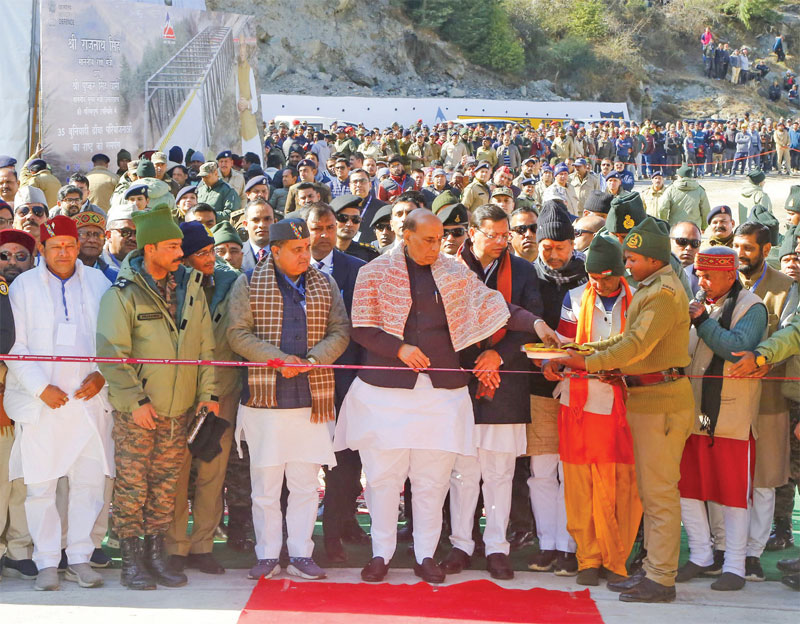Rajnath Singh inaugurates 29 bridges and six roads across seven states and UTs
A FORCE Report
Defence minister Rajnath Singh unveiled 29 bridges and six roads constructed by the Border Roads Organisation (BRO) at a total cost of Rs 670 crore on 19 January 2024. The inauguration ceremony took place at the Dhak bridge, a state-of-the-art 93-metre-long Class 70R bridge over Dhak nullah on Joshimath-Malari road in Uttarakhand. This bridge holds strategic importance as it provides increased connectivity to the border areas. The 35 infrastructural projects, constructed under challenging weather conditions, span across Jammu & Kashmir, Ladakh, Arunachal Pradesh, Uttarakhand, Sikkim, Mizoram, and Himachal Pradesh.

While Singh physically inaugurated the bridge, 34 other roads and bridges were e-inaugurated by him. Of these, one notable project includes the Ragini-Ustad-Pharkian Gali Road in Jammu & Kashmir, a 38.25-km long CL-9 road that enhances all-weather connectivity between Tangdhar and Keran sector.
Singh applauded the BRO for its commendable efforts in fortifying the country’s border infrastructure. He emphasised that the construction of roads and bridges by the organisation plays a vital role in linking geographically isolated regions with the rest of the nation, fostering a sense of unity among the people living in remote villages.
Highlighting the government’s approach towards border area development, Singh said that previous administrations considered these regions as the country’s periphery. In contrast, the present government perceives border areas as integral parts of India’s identity and is committed to establishing world-class infrastructure in these zones.
Singh underscored the strategic importance of providing connectivity to every border area through the construction of roads, bridges, and tunnels. He emphasised that this work not only holds strategic significance but is also pivotal for the welfare of the people residing in these remote regions, equating their contributions to that of soldiers safeguarding the nation.
Addressing the shift in perspective, Singh said that the government no longer views border areas as mere buffer zones between plains and potential adversaries. Instead, these regions are considered an essential part of the mainstream. “Under the leadership of Prime Minister Modi, our government is committed to the development of border areas, keeping in view the nation’s security needs. We do not consider these areas as buffer zones. They are a part of our mainstream,” he said.
Furthermore, he highlighted the government’s proactive approach, asserting that ‘New India’ is not waiting for potential adversaries to reach the plains but is actively developing infrastructure on mountains and deploying troops on hill borders. This approach aims to ensure the safety of the residents in these areas and effectively address potential threats. Expressing concern about the large migration from border areas in Uttarakhand, the defence minister said that the Prime Minister and the chief minister of the state are actively implementing schemes related to infrastructure development. The goal is to extend the development journey from the seas to the borders, ensuring comprehensive progress.
In addressing the rising number of natural disasters in some border states and Union Territories, Singh recognized climate change as a serious issue related to national security. He highlighted the ministry of defence’s commitment to seeking cooperation from friendly countries in addressing this critical concern.
Singh acknowledged the BRO’s contribution during the recent Silkyra Tunnel operation in Uttarakhand. He praised the coordinated efforts of various agencies, including the National Disaster Response Force, BRO, Indian Air Force, and state agencies, as a commendable example of teamwork during a crisis.
Regarding the workforce engaged with the BRO, including armed forces personnel, permanent civilian employees, and casual paid labourers (CPLs), Singh described them as a unique team working together to strengthen the border framework. He emphasised the positive impact of the government’s changed mindset, recognising the contribution of CPLs and ensuring their inclusion in the organisation’s development efforts.
The minister listed several steps taken by the ministry to enhance the quality of life and overall well-being of the BRO personnel, including CPLs and their next of kin. These measures, including increased allowances and insurance provisions, aim to boost the morale of the workforce.

